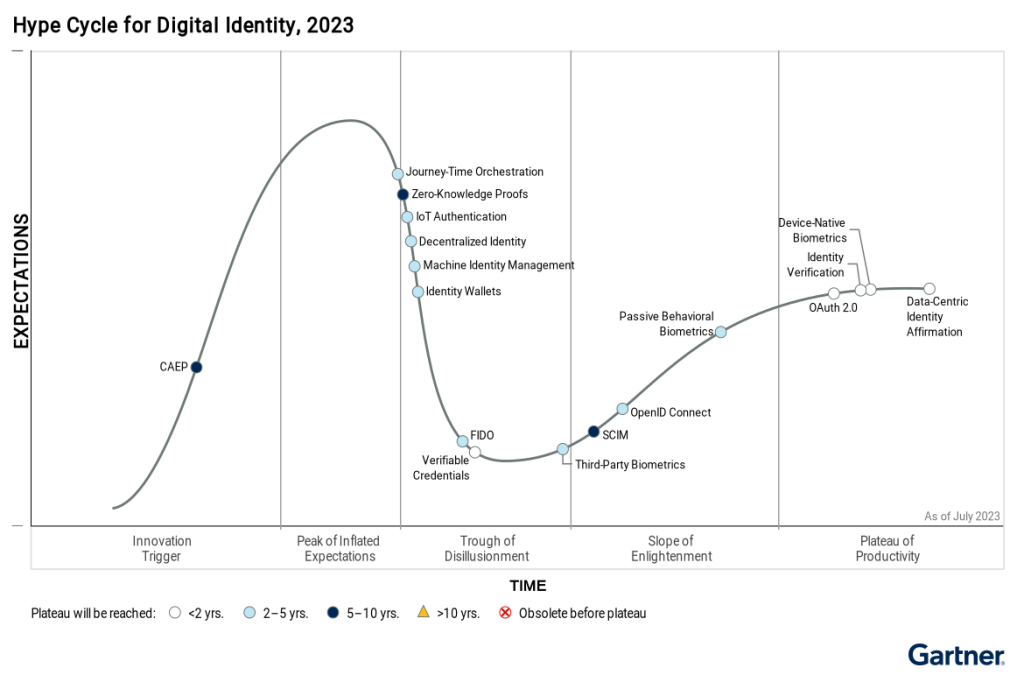
Hype Cycle™ for Digital Identity, 2023
Gartner research finds that “as digital identity becomes fundamental in everyone’s lives, organizations’ identity and access management challenges multiply.” Aimed at security and risk management leaders, this new Gartner report identifies innovations in digital identity, analyses their position in the ‘hype cycle’, and recommends how these can be used to address challenges.

Context
The Gartner report outlines that “Electronic identification, authentication and authorization have existed for over 60 years. However, most organizations address the challenges of account takeover fraud, identity theft, data breaches and governance with siloed solutions — often eroding user experience.”
“Over the past 20 years, there has been an increase in the use of identities (such as federation and portable identities) across organizational boundaries. Technologies like identity wallets will continue to grow, enabling people and systems to share information selectively or prove eligibility while maintaining privacy.”
“Digital identity extends personal identity beyond physical presence and is becoming widely distributed across multiple organizations and systems. Also, organizations are challenged to manage identities for machines — for example, workloads and devices.”
“There is an emerging ecosystem of people, machines and organizations that uses, shares and protects elements of their identities via trusted infrastructures to get access to assets or validate claims. Substantial, continued innovation underpins and enables new business models.”
What is the Gartner Hype Cycle?
Gartner Hype Cycle reports provide a graphic representation of the maturity and adoption of technologies and applications, and how they are potentially relevant to solving real business problems and exploiting new opportunities
The Hype Cycle Reports look at technologies from the “Innovation Trigger” phase, which Gartner frame as a “breakthrough” which “generates significant media or industry interest”, through to the “plateau of productivity” where the “real world benefits of the innovation are demonstrated and accepted”. Through this process the Gartner research analyses the time to mainstream adoption.
| Phase | Description |
|---|---|
| Innovation Trigger | A breakthrough, public demonstration, product launch or other event generates significant media and industry interest. |
| Trough of Disillusionment | Because the innovation does not live up to its overinflated expectations, it rapidly becomes unfashionable. Media interest wanes, except for a few cautionary tales. |
| Peak of Inflated Expectations | During this phase of overenthusiasm and unrealistic projections, a flurry of well-publicized activity by technology leaders results in some successes, but more failures, as the innovation is pushed to its limits. The only enterprises making money are conference organizers and content publishers. |
| Slope of Enlightenment | Focused experimentation and solid hard work by an increasingly diverse range of organizations lead to a true understanding of the innovation’s applicability, risks and benefits. Commercial off-the-shelf methodologies and tools ease the development process. |
| Plateau of Productivity | The real-world benefits of the innovation are demonstrated and accepted. Tools and methodologies are increasingly stable as they enter their second and third generations. Growing numbers of organizations feel comfortable with the reduced level of risk; the rapid growth phase of adoption begins. Approximately 20% of the technology’s target audience has adopted or is adopting the technology as it enters this phase. |
| Years to Mainstream Adoption | The time required for the innovation to reach the Plateau of Productivity. |
The Hype Cycle for Digital Identity
This Hype Cycle focuses on “innovations that enable secure and trusted digital interactions among people, machines and assets. These interactions are, in turn, based on digital representations of people and machines’ physical (real-world) and virtual (electronic) identities.”
Gartner reseach describes where innovations lie on the ‘Hype Cycle’: “Post-trigger innovations outside the digital identity space, such as the metaverse, Web2.5 and generative AI, will likely drive specific digital identity innovations in the coming years. Most innovations specific to digital identity now lie beyond the peak of the Hype Cycle.”
“Continuous Access Evaluation Profile, which provides mechanisms to share security events between security and identity tools, has moved forward only a little. Other protocols that underpin a modern digital identity fabric will continue to mature and now lie beyond the trough, namely System for Cross-Domain Identity Management, OAuth 2.0 and OpenID Connect.”
“Journey-time orchestration has quickly moved past the peak. This is a result of its success in reducing the complexity of managing multiple identity verification, ATO prevention and authentication vendors in the user journey and its increasing availability with customer identity and access management (IAM) tools.”
“A variety of innovations that enable people and organizations to validate and share identities and attributes while preserving privacy are now past the peak, namely zero-knowledge proofs, decentralized identity and identity wallets.”
“Verifiable credentials are further advanced and moving quickly, with many IAM vendors already offering verifiable credentials or adding this capability to their portfolios. Innovations that manage and assert the digital identities of machines have made significant movements past the peak. This includes Internet of Things authentication and machine identity management.”
“Authentication methods will continue to mature, with Fast IDentity Online authentication protocols having the most forward momentum, driven by the interest in passkeys — that is, multidevice credentials. Innovations providing confidence in real-world identity claims are reaching plateau. This includes identity verification and data-centric identity affirmation.”
Gartner, Hype Cycle for Digital Identity, 2023, Ant Allan, Nathan Harris, 26 July 2023. Gartner is a registered trademark and service mark and Magic Quadrant is a registered trademark of Gartner, Inc. and/or its affiliates in the U.S. and internationally and are used herein with permission. All rights reserved. This graphic was published by Gartner, Inc. as part of a larger research document and should be evaluated in the context of the entire document.
To find out more:
- Learn more about Microsoft’s approach to decentralized identity
- Find out more about Microsoft Entra Verified ID
About the Center of Expertise
Microsoft’s Public Sector Center of Expertise brings together thought leadership and research relating to digital transformation in the public sector. The Center of Expertise highlights the efforts and success stories of public servants around the globe, while fostering a community of decision makers with a variety of resources from podcasts and webinars to white papers and new research. Join us as we discover and share the learnings and achievements of public sector communities.
Questions or suggestions?






